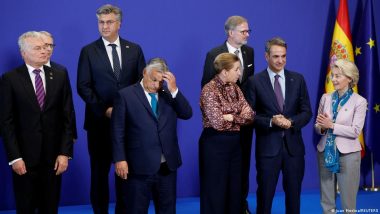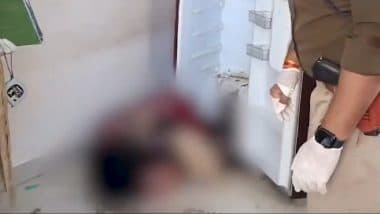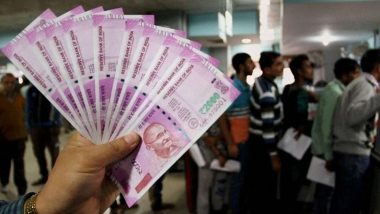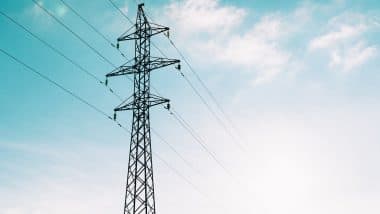European leaders failed to agree on a joint declaration on reform to the bloc's asylum and migration rules. Instead, the statement only addressed EU enlargement.
European leaders met in Spain to discuss EU enlargement and how to tackle a migration crisisAlso Read | Poland and Hungary Block EU Statement on Migration.
Leaders remain at odds about how to tackle the growing number of refugees and migrants arriving in Europe
Poland and Hungary had expressed their disagreement on the European Union's migration policyAlso Read | Sikkim Flash Floods: 22 Bodies Recovered From West Bengal Including Six Indian Army Personnel.
German Chancellor Olaf Scholz urged caution over EU expansion
You can find more coverage of the European Union here.
EU leaders remain divided over migration
Poland and Hungary have blocked a joint declaration on migration policy after an informal gathering of European Union leaders in Granada, Spain, on Friday.
Their disagreement comes despite an earlier agreement among the bloc's diplomats this week to present a migration reform package to the European Parliament, aiming to share responsibility for undocumented arrivals better.
Hungarian Prime Minister Victor Orban insisted the decisions should have been taken by consensus.
Polish Prime Minister Mateusz Morawiecki also rejected reference to the migration policy in the Granada summit's joint statement.
French President Emmanuel Macron said though Poland and Hungary disagreed with EU migration policy, it did not necessarily mean that any final deal on the matter would be blocked.
German Chancellor Olaf Scholz rejected Poland and Hungary's stance.
"I am convinced that the rules which we agree on with each other will then also apply to everyone," he said.
The summit's statement only addressed the other issue on the agenda, the bloc's enlargement.
European Commission President Ursula von der Leyen insisted, "the accession process to the European Union is a merit-based one."
Speaking after the meeting, she said there were "no short cuts" regarding this accession process.
This live coverage article of the EU leaders' meeting in Granada is now closed. Thank you for reading.
Poland formally rejects migration declaration
At the end of the summit in Granada, Polish Prime Minister Mateusz Morawiecki said Warsaw had rejected a joint statement on migration.
Instead, the collective communication would only address the other issue on the agenda, namely the bloc's possible expansion.
"As a responsible politician, I reject the whole paragraph of summit conclusions regarding migration," Morawiecki wrote on X, formerly known as Twitter.
Migration deal still possible, says Macron
French President Emmanuel Macron said Friday that even though Poland and Hungary had rallied against the EU's migration policy, this did not mean a final pact on the issue was not plausible.
"They [Warsaw and Budapest] expressed, around the table, their disagreement, which they have already expressed at a ministerial level, but it is not of a nature to block a decision which would be done by a qualified majority," said Macron at a news conference after the meeting in Granada.
EU ponders mission to reduce migrant crossings from Tunisia
The EU is considering expanding a military deployment in the Mediterranean Sea to curtail crossings by migrant boats from Tunisia, the bloc's foreign policy chief Josep Borrell said in Granada on Friday.
Operation Irini is currently deployed to keep an eye on an arms embargo against Libya. However, it is also intended to contribute to the fight against people smuggling and human trafficking by collecting intelligence.
Tunisia has become a popular sending-off point for refugees from other parts of Africa, while en route to Europe.
Upon arrival at the summit in Andalusia, European Commission President Ursula von der Leyen called for more agreements with countries outside the bloc, such as the accord recently struck with Tunisia, to reduce the number of arrivals.
EU figures show sharp increase in irregular migrant returns
As European leaders meet with migration reform a major issue dividing them, the bloc circulated figures on Friday showing a 29% rise in irregular migrant returns in the second quarter of 2023, compared to the same period a year before.
A total of 26,600 people were returned, while the number ordered to leave rose by 9% to 105,865.
By the end of August, EU member states were hosting almost 4.2 million Ukrainian refugees, around half of whom were in Germany and Poland.
Orban reiterates migration stance
Leaders of the EU's 27 nations are grappling with the issue of migration in Granada, just two days after the bloc's ambassadors agreed a reform package strongly opposed by Hungary and Poland.
Hungarian Prime Minister Viktor Orban, an outspoken critic of migration to the bloc, reiterated his stance as he arrived at the summit in southern Spain.
The migration reforms, which oblige states to take in a share of migrants or pay the countries that do, prompted a stinging rebuke from Orban.
Orban expressed his anger by likening the recent agreement to being "legally raped."
"Poland and Hungary were not satisfied with the proposal... so after this, there's no chance of having any kind of compromise and agreement on migration. Politically, it's impossible ... because legally we were — how to say it — we were raped," he added.
With Poland holding a general election next week, its populist government said the bloc's plans to overhaul the rules on asylum seekers and irregular migrants as a "diktat" from Brussels and Berlin.
"I will tell the session today that Poland squarely rejects that, first and foremost because of the security of our country," Polish Prime Minister Mateusz Morawiecki said.
Scholz urges caution over EU expansion
German Chancellor Olaf Scholz said EU states have to address various financial dilemmas related to introducing new members.
EU nations pay into a common budget, some of which is redistributed to benefit economically struggling regions.
"Everyone knows that it cannot remain the case that all countries that receive net payments today can count on this being the case in the future," Scholz said, as he arrived at the summit in Spain.
"They will have to contribute to financing the economic growth processes in the accession countries," he added.
Farmers across the bloc receive subventions from the budget. Should Ukraine with its significant agricultural sector join the bloc, all EU states could be impacted.
While Brussels remains steadfast in its support of Ukraine as it continues to fend off Russia's full-scale invasion of the country, the topic of how and when the war-torn nation will join the bloc is more complex.
Within days of Russia launching an assault on Ukraine in February 2022, the EU stated its support for the notion of Kyiv joining the bloc.
Though she supports Ukraine's ascension to the bloc, European Commission President Ursula von der Leyen has called for patience.
The EU's newest member, Croatia, joined in 2013, a formal process which was a decade in the making.
What is on the agenda?
European Union leaders reconvene in southern Spain on Friday to discuss a number of contentious issues.
Ukraine's accession to the bloc is on the agenda, as is the manner of reducing the bloc's reliance on non-EU countries when it comes to digital technologies.
But perhaps the thorniest topic will be how to handle migration, with the bloc coming under fire recently for outdated policies toward refugees trying to enter EU countries.
Also on the agenda is how can the EU can reduce its reliance on countries outside the bloc — namely China — when it comes green and digital technologies.
In a letter to EU leaders before the summit, European Council President Charles Michel said Russia's full-scale invasion of Ukraine had prompted Brussels to build a more robust economic base, and once less dependent on non-EU countries.
Michel said the meeting in Granada would offer a chance to define a strategy to ensure EU's resilience and competitiveness in a challenging geopolitical environment.
The summit in Spain will help steer discussions in the coming months on European Commission proposals that could lead to tighter control of exports and outflows of technologies, particularly those that could be put to military use.
Of particular concern is the bloc's economic security linked to advanced semiconductors, artificial intelligence, quantum technology and biotechnology.
jsi/kb (AP, Reuters, dpa, AFP)
(The above story first appeared on LatestLY on Oct 06, 2023 10:11 PM IST. For more news and updates on politics, world, sports, entertainment and lifestyle, log on to our website latestly.com).






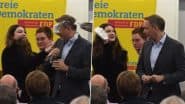

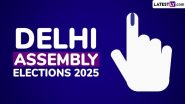
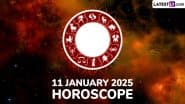

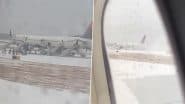

 Quickly
Quickly









